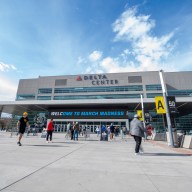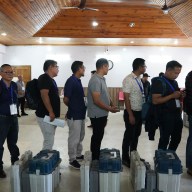KANDAHAR, Afghanistan — Canada’s armed forces are looking for young aboriginals who want to build on the long history of their ancestors in helping to defend Canada.
And as the Canadian Forces prepare to mark the military’s self-proclaimed Aboriginal Day on Thursday, native soldiers in Afghanistan are echoing the call to a segment of the Canadian population — aboriginal, Inuit and Metis — that’s represented by only four per cent of Canada’s military personnel.
“A lot of the fear is leaving the community that you’re used to,” said Cpl. Darryl Francis Knockleby, a ground technician with the 436th Transport Squadron, based in Trenton, Ont., during a recent interview at Kandahar Airfield.
“I didn’t have that problem, growing up in a military setting.”
Knockleby serves in the same squadron with his father, Master Warrant Officer Darryl Murray Knockleby, a flight engineer on a C130 transport plane and a strong advocate of the military way of life.
“There are people in Canada in some aboriginal situations that could totally benefit from a future in the armed forces,” said the elder Knockleby, who hails from Bashaw, Alta., a farming community an hour’s drive southeast of Edmonton.
“I’m sure they’d be totally surprised and (would) completely enjoy it.”
Lt.-Col. Jocelyn Paul, a Huron from Wendake, Que., who commands the 2nd Battle Group of the Royal 22e Regiment in Afghanistan, points out natives have helped defend Canada for centuries.
“Aboriginals were at the forefront of defending New France,” said Paul, who holds a degree in military history. “All the current reserves in the St. Lawrence Valley helped to defend the colony against the British and, following the conquest by the British, the Americans.”
Aboriginals are regarded as ideal candidates for the military because many of them are young and face a dearth of career or educational opportunities on their respective reserves.
Paul said he doesn’t feel assimilated, even though he left home 20 years ago. His children, who live in Quebec City, Washington, D.C. and Ottawa, are fluent in French, English and Montagnais, the language of their maternal grandmother.
“To make the reserves stronger, we must leave,” he said. “When we come back, we are more well-rounded as individuals who can bring much more to the communty.”
Sonia Laine, who joined the military in 2007 and whose husband is a retired soldier, says some people in her native community of Wendake, a short drive northwest of Quebec City, are perplexed about the mission in Afghanistan.
“’Why do we risk our lives there, why not stay in the village with the rest of us?”’ Laine said, citing a common attitude among some of her fellow townsfolk. “Like many Canadians, they have trouble understanding why we want to participate in missions like this.”
Laine acknowledged that while military life isn’t for everyone, she considers the Forces “a big family.”
It certainly is for Darryl Murray Knockleby, whose father served as a sniper in the Second World War. Knockleby credits the air force for helping make him the man he is today.
“Maybe a real sharpshooter might be a handy guy to have around, but that’s not the only skill set,” he said. “There’s doctors, lawyers, technicians, sailors, admin clerks and dental hygenists” with a military background.
“The whole world is open.”
















